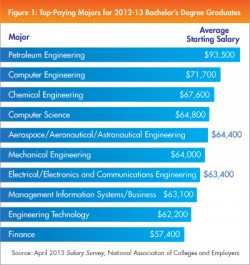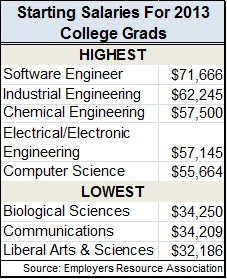 With only days left before this year’s college seniors become alums, those who don’t already have jobs are going to find it as hard to find work as last year’s grads did. And for those in the liberal arts, in the last few weeks, three different surveys of hiring managers and recruiting leaders found employers are only planning slight — if any — increases in the number of entry-level grads they bring on board.
With only days left before this year’s college seniors become alums, those who don’t already have jobs are going to find it as hard to find work as last year’s grads did. And for those in the liberal arts, in the last few weeks, three different surveys of hiring managers and recruiting leaders found employers are only planning slight — if any — increases in the number of entry-level grads they bring on board.
Most striking about the surveys is that while they measured different aspects of hiring plans, and talked to different types of companies and employers, the bottom line was the same: entry-level jobs in a grad’s field are few.
Here’s what the three surveys found:
- Adecco: 58 percent of hiring managers in this survey have zero plans to hire a grad. Of the 42 percent who said they may hire an entry-level grad, almost 7 out of 10 said they expected to make only one or two hires.
- C
 areerBuilder: 53 percent of employers surveyed plan to hire new grads. That’s essentially no change from last year’s 54 percent who said they’d be hiring. Tech grads will fare better; 26 percent of employers will be looking to hire them. Many of the other jobs will be in customer service and sales.
areerBuilder: 53 percent of employers surveyed plan to hire new grads. That’s essentially no change from last year’s 54 percent who said they’d be hiring. Tech grads will fare better; 26 percent of employers will be looking to hire them. Many of the other jobs will be in customer service and sales. - NACE, the National Association of Colleges and Employers, said that its survey of employer intentions found a 2.1 percent increase in the number of firms planning to hire entry-level workers. That’s an even more discouraging result than it may seem, since NACE’s fall 2012 survey found 13 percent expecting to increase their college grad hiring. And now, somewhat more than a third of respondents told NACE they expected to hire fewer this year than last.
For STEM grads, the hiring picture is significantly better. They are not only more likely to find a job, but their starting pay will eclipse the liberal arts grads. NACE says petroleum engineers get the highest starting pay — $93,500. That’s $22,000 more than computer engineers are being offered. The money reflects the huge demand, thanks to the booming energy sector and the surge in energy prices, as well as the relative scarcity of talent.
 CareerBuilder’s survey of the most in-demand new college grads are those with majors in business (by 31 percent of employers), Computer and IT (24 percent), Engineering (17 percent), Health professions and related clinical sciences (10 percent), Engineering technologies (nine percent), and Math and statistics (nine percent). At the bottom: liberal arts and humanities (6 percent).
CareerBuilder’s survey of the most in-demand new college grads are those with majors in business (by 31 percent of employers), Computer and IT (24 percent), Engineering (17 percent), Health professions and related clinical sciences (10 percent), Engineering technologies (nine percent), and Math and statistics (nine percent). At the bottom: liberal arts and humanities (6 percent).
One more survey, this one from Employers Resource Association, a membership organization of 1,300 firms in Ohio, Kentucky, and Indiana, said top starting salaries for entry-level grads go to STEM majors. At the bottom, liberal arts.
The clear message from the surveys is that a college degree can be a ticket to a well-paying job, if the degree is in a field that is in demand. Research by the Brookings Institute not only confirmed what the surveys show, but also concluded that:
For certain schools, majors, occupations, and individuals, college may not be a smart investment. By telling all young people that they should go to college no matter what, we are actually doing some of them a disservice.